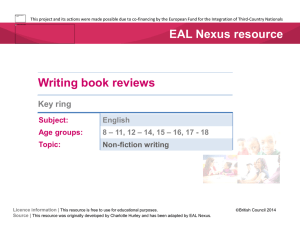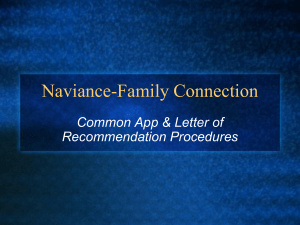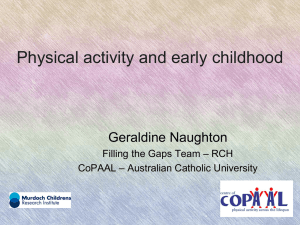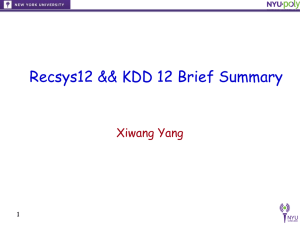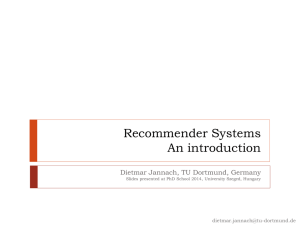Slides
advertisement
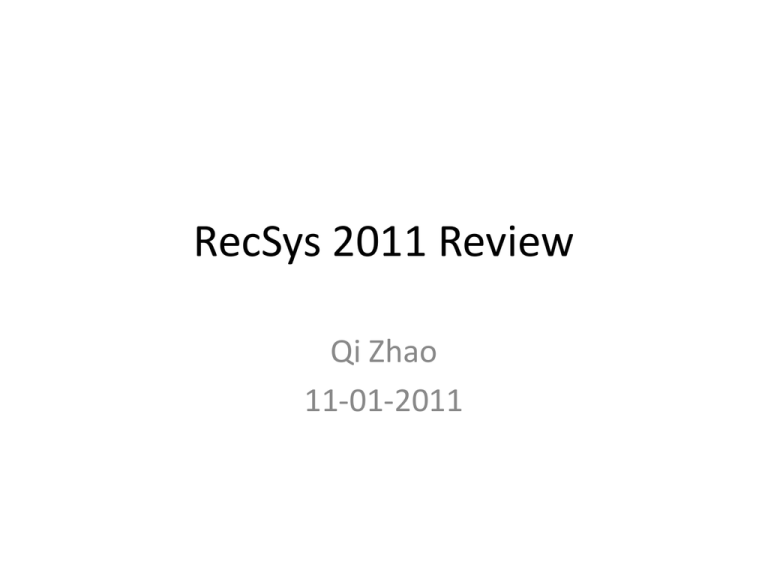
RecSys 2011 Review Qi Zhao 11-01-2011 Outline • Overview • Sessions – Algorithms – Recommenders and the Social Web – Multi-dimensional Recommendation, Contextawareness and Group Recommendation – Methodological Issues, Evaluation Metrics and Tools – Human factors – Emerging Recommendation Domains • Conclusion Overview • Participants – Student, professor – Research Institutes, like Yahoo! Research, eBay Research, Microsoft Research, etc – Industry. Twitter, Google, Facebook, Netflix, LinkedIn, etc • Oral papers, posters, workshops, demos • Themes – Algorithm – Recommendation and the Social Web – Multi-Dimensional Rec, Group Rec, Context-Aware Rec – Evaluation Metric – Human factors – Emerging Domains Session: Algorithm • Major issues to tackle – Cold start Generalizing Matrix Factorization Through Flexible Regression Priors • Motivation – Warm-start scenario: low-rank factorization + regularization – Zero-mean regularization – Handle cold-start scenario • New users • Approach – GMF • Regularization based on Non-linear regression on user /item feature Shared Collaborative Filtering • How it works? – Leverage the data from other parties to improve own CF performance • Issues – Privacy concerns when sharing the community data Session: Recommender Systems and the Social Web Recommendation in Social Rating Networks • Social Rating Network – User-user relationship – User express ratings over some items – Example: Epinions, Flixter, • Why use social networks in recommendation? – Selection and social influences by sociologist – Selection: tendency to relate to people with similar attributes • SNR: similar rating behavior – Social influence: adopting ratings from friends • Selection and social influence drive the formation of like-minded and wellconnected users. • Challenges – Mixed groups, social relations – Generalized Stochastic Block Model • Mixed group membership for both users and items Personalized PageRank Vectors for Tag Recommendations: Inside FolkRank • Setting: Folksonomy – User, Tags, Resources(flickr, del.icio.us, etc) – User assign tags to resources. • Problem – Ranking tag, user and resource – Tag recommendation • Main contribution – Present and formalize the FolkRank model – Present FolkRank-like model which provides fast tag recommendation Session: Multi-dimensional Recommendation, Context-awareness and Group Recommendation Multi-Criteria Service Recommendation Based on User Criteria Preference • Using multiple criteria to value the product or service – E.g. Restaurant – price, location, quality of food, service speed, etc • User has her own preference over the attributes • Cluster users based on their preference – Prediction based on users within the same cluster The Effect of Context-Aware Recommendations on Customer Purchasing Behavior and Trust • Content-Aware Recommendation Systems(CARS) – Additional information like location, time, your companies, etc • Effect on Purchasing Behavior – Accuracy – Trust. Recommendation should be credible and objective. • Methodology – – – – Controlled experiment Three methods: content-based, CARS, random Metric: accuracy, diversity(entropy) Purchasing change: Money spend on the product Group Recommendation • Recommendations for a group of people instead of individuals – E.g. people sitting around watching tv • The challenge – Aggregated preference might be diverse – Depend on the group’s characterizer – Homogeneous or Heterogeneous • Similar demographic information or not Session: Methodological Issues, Evaluation Metrics and Tools OrdRec: An Ordinal Model for Predicting Personalized Item Rating Distribution • Common views upon feedbacks – Numerical values – Apply Collaborative Filtering • About numerical ratings – Different users have their own internal scale – Hard to assign a numerical value – Ranking products through comparing • Humans are more consistent when comparing products than giving absolute scores • Ordinal – Express relative preference over items • Evaluation – RMSE – Fraction of Concordant Pairs(FCP) – OrdRec outperforms existing approaches: SVD++, RBM, MultiMF Session: Human factors A User-Centric Evaluation Framework for Recommender Systems • ResQue(Recommender system’s Quality of User Experience) – Understanding issues of RecSys • Evaluation Layers – Perceived system qualities – User’s belief – Subjective attitude – Behavioral intention • Experiment Design – Survey on 239 participants Cont. Session: Emerging Domains • Yahoo! Music Recommendation: Modeling Music Ratings with Temporal Dynamics and Item Taxonomy • CrimeWalker: A recommendation Model for Suspect Investigation • Personalized Activity Stream: Sifting through the “River of News” Conclusion • Modeling the Recommendation – Collaborative Filtering – Incorporating additional features • Evaluation Metrics – Accuracy, Diversity, Novelty, etc • Adapt to Constantly Changing Internet Ecosystem – Social Network – Realtime Activity Stream



